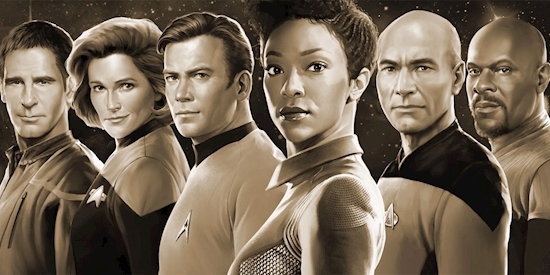How to Begin a Star Trek Binge for New Trekkies
On the air for nearly 55 years, Star Trek has thrilled millions of fans worldwide as audiences have embraced one of the few, idealistic utopian visions of the far future driven by Starfleet and the United Federation. As the inaugural season of Star Trek: Picard came to an end, CBS All Access announced it would offer a free trial subscription of the premium streaming service. With households around the world self-isolating in the face of the ongoing coronavirus (COVID-19) pandemic that may have access to the iconic science fiction for the first time, we break down how a Star Trek newbie should approach binging the franchise.
Click the button below to start this article in quick view. Start nowThe original series, which ran for three seasons from 1966 to 1969 remains the most iconic, as Captain Kirk commands the U.S.S. Enterprise on a five-year exploratory mission to boldly go where no one has gone before. Joined by Mister Spock, Doctor McCoy, Scotty, Uhura, Sulu, and Chekhov, there are many episodes that continue to stand the test of time decades later, including "City on the Edge of Forever," "Arena," "Journey to Babel," and more. Having said that, many episodes do feel like products of their time, with an undercurrent of dated gender politics and contrived storytelling. And there are definitely episodes that could be skipped without great consequence -- including "Spock's Brain" and "Plato's Stepchildren," the latter only notable for television's first interracial kiss -- largely from Season 3 that had seen significant budget cuts and creative shake-ups behind-the-scenes.
However, the legacy of the original series still looms large over the rest of the franchise's mythos, both on television and on the big screen. Most of the original series' main cast would reunite for two seasons of Star Trek: The Animated Series from 1973 to 1974. While certainly an interesting curio, it isn't required watching for newfound Star Trek fans and nor is 1979's Star Trek: The Motion Picture. The inaugural Star Trek feature film tells a slow, philosophical story, incredibly self-serious and deliberate in its pacing. While the franchise's biggest box office success for decades, the subsequent movies and series distanced themselves from it due to its mixed reception.
Instead, fans should follow the original series with 1982's Star Trek II: The Wrath of Khan, which wrapped up a major plot thread from the Season 1 episode "Space Seed." Perhaps the single greatest installment in the franchise's cinematic history, the film saw the Enterprise's old enemy Khan Noonien Singh resurface to seek his vengeance. A success with critics and fans alike, the film served as the first installment of a narrative trilogy that continued with 1984's Star Trek III: The Search for Spock and 1986's Star Trek IV: The Voyage Home, all worth a watch. 1989's Star Trek V: The Final Frontier can be avoided, with the franchise quietly retconning its events -- as seen in Star Trek: Discovery's second season -- although 1991's Star Trek VI: The Undiscovered Country remains a worthwhile watch.
Instead of continuing with the film's cinematic entries, audiences should continue on with Star Trek: The Next Generation. While the first season of the series' seven-season run, from 1987 to 1994, is the shakiest, it does introduce the cast and establish themes that permeate throughout the show. Perhaps watch the two-part series premiere and then skip ahead to the third season premiere when the show finally finds its voice and the overall quality evens out. Similarly, not every film starring The Next Generation cast needs to be watched, with 1998's Star Trek: Insurrection probably better left unwatched on an initial binge.
Running for seven seasons from 1993 to 1999, Star Trek: Deep Space Nine is perhaps the most underrated Star Trek series -- and its darkest to date with the latter half spent on a galaxy-spanning war. While the change in pacing and tone may throw off audiences coming off the more exploratory drive of preceding series, Deep Space Nine takes full advantage to craft deeper interpersonal stories and interstellar intrigue. The follow-up series Star Trek: Voyager can similarly feel like a jarring shift given its premise of a starship simply trying to return home but definitely improves as the series proceeds over its own seven-season run from 1995 to 2001.
While the final traditionally broadcast television series Star Trek: Enterprise certainly has its moments, it is another series that can perhaps be skipped in an initial rewatch. Similarly, while the 2009 cinematic reboot of the franchise is worth watching -- especially given its impact on Star Trek: Picard -- its two sequels can be ignored, with quality steadily declining while the cinematic trilogy struggled to find its own voice despite its appealing cast. Star Trek has been a franchise that really works better on television than the big screen and the latest generation of programming has proved that.
The first season of Discovery can be skipped -- like many preceding series, the CBS All Access show didn't find its voice and tone until its second season, tying more directly to the original series as it charted its own course forward. And the first season of Picard has been a delight, especially when it leans into the history of the wider mythos, not just The Next Generation but also Voyager, blending the 90s era of Star Trek together effortlessly. With 24 seasons of television across six different series and eight feature films, there is plenty of content for audiences to enjoy for the first time or old fans to lovingly revisit. After all, it's Star Trek that urges its viewers to come together and dream of a more utopian future providing an optimistic future of what humanity could -- and should -- become.
Source: www.cbr.com

